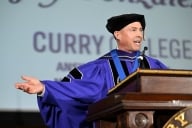You have /5 articles left.
Sign up for a free account or log in.

English departments can better support students majoring in English through intentional career development and having conversations about the outcomes of English majors.
FG Trade/E+/Getty Images
In the past few years, the English major has come under scrutiny as a degree that does not benefit students in their career aspirations and is less selected by students, but English faculty strongly disagree. A new report, authored by English professors, provides a fact-based look at the English major and what English departments should know.
The report draws on research from a committee within the Association of Departments of English (ADE), part of the Modern Language Association (MLA), that identified career outcomes for English majors and minors, effective strategies in teaching, and curricular innovations in career development.
“Any steps departments take to begin and sustain career preparation efforts will make an enormous difference to students,” according to the authors. “In this report, we share a range of possibilities and recommendations, in the hopes that some will fit your departmental resources, needs and contexts.”
State of play: Unemployment rates among English majors (2.3 percent) are similar to the average college graduate (2.17 percent) and slightly higher than business, engineering and philosophy majors (2.0), according to 2018 National Humanities Alliance data.
Additional Data
A 2024 Strada Education report found 45 percent of students who majored in humanities and cultural studies (which includes English, foreign language, history, philosophy, theology and liberal arts) were employed in a college-level role, ranking below STEM programs, interdisciplinary studies and visual and performing arts, among other majors.
Humanities and cultural studies majors had median annual earnings of $41,000 one year after graduating, as well.
According to 2018 Hamilton Project data, the median annual earnings at career peak for full-time workers with an English undergraduate degree was $76,000, and $83,000 if English majors earned a graduate degree. These figures are slightly lower compared to all other majors, with $78,000 for undergraduate degrees and $86,000 for graduate degrees.
Job satisfaction survey finds that 84 percent of humanities graduates are satisfied with their jobs and 78 percent believe they are living their best possible life, according to Humanities Indicators.
Equity gaps exist in career outcomes among humanities graduates, with men making more on average ($74,000) than women ($61,000) and white graduates earn more ($53,700) than Latino ($47,600) and Black graduates ($45,100).
English degrees help graduates in a variety of fulfilling and financially stable careers, so it is critical that faculty and staff members help students see through the long list of available positions they could fulfill and translate students’ skills into marketable attributes and career paths.
The ten most common occupations held by English majors are: elementary and middle school teachers, postsecondary educators, judicial workers (lawyers, judges and magistrates), managers, secondary school teachers, education and childcare administrators, writers and authors, editors, secretaries and administrative assistants, and retail salespersons.
The need for career development: While the data points to prosperous, thriving lives that English majors can hold after graduation, it is the responsibility of the department to help students navigate their early stage of careers and help them understand typical career trajectories for English majors.
Career development can also help close equity gaps, and some support for early career professionals can have a profound impact on lifetime earnings (for example, if students negotiate higher starting salaries). Networking and skill development can also have a similar impact on students’ overall preparation and future growth.
These initiatives also must be sustainable, not reliant on a small group of faculty and staff members or to specific courses, but integrated within department leadership goals and supported and funded by administrators.
The committee recommends English departments engage in best practices in career development, which include:
- Directly participate in career preparation. While campus partnerships can create a greater network of support for students in their career development, faculty members should work with students individually in their career preparation, not just refer them to career counseling. Some faculty members have only worked in academic roles, so providing training on career preparation may be needed.
- Engage with alumni networks to understand effective career preparation. Often, alumni have the most relevant feedback on how an academic program benefited them in their early careers, so they should be used as a trusted source of information.
- Use authoritative data on salaries and career outcomes. Faculty departments should be equipped with up-to-date and relevant data to share with students, parents and public audiences who are curious about the value of the English major.
- Help students become aware of the skills they’re developing and explicitly connect skills to employment opportunities. Departments can group career tracks students may be interested in—such as education, legal fields or writing, publishing and editing—to help translate how learned skills are required for professional fields.
- Acknowledge and celebrate the diversity of career outcomes English majors pursue. One of the tenants of the English major is the various paths a student can embark on after completing their degree, and this should be recognized and supported by faculty.
- Develop curricular and cocurricular programs to help students through career preparation with clarity, whether that’s workshops, in-class exercises or experiential learning. These initiatives should account for local contexts and workforce opportunities near the institution, as well.
- Support faculty labor in career preparation efforts. If professors are taking on additional work to create and distribute career development content, they should be compensated appropriately.
Get more content like this directly to your inbox every weekday morning. Subscribe here.







